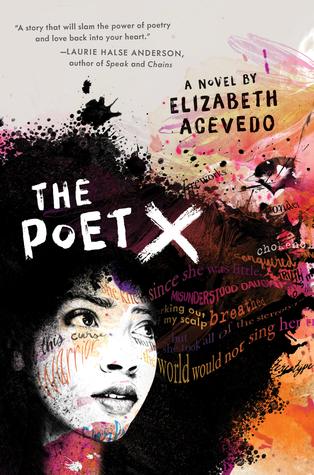
Congratulations to Dominican-American poet and author Elizabeth Acevedo who was today announced as the winner of the 2019 Carnegie Medal for her debut YA novel, The Poet X.
Since 1936, the Carnegie Medal (which boasts a list of former winners that includes Arthur Ransome, CS Lewis, and Neil Gaiman) has been awarded for excellence in children’s literature. Now, for the first time in its 83-year history, a writer of color has won this prestigious award. The winner of the 2018 National Book Award for Young People’s Literature and told in verse, The Poet X follows Xiomara, a quiet Dominican girl raised in Harlem, who pours all her frustration into poetry.
The judges called Acevedo’s debut “a searing, unflinching exploration of culture, family and faith within a truly innovative verse structure,” noting that Xiomara “comes to life on every page and shows the reader how girls and women can learn to inhabit, and love, their own skin.”
*

When your body takes up more room than your voice
you are always the target of well-aimed rumors,
which is why I let my knuckles talk for me.
“Elizabeth Acevedo’s debut novel, written in verse, continuously draws in its reader with sensory-igniting imagery. This work is broken into three major sections, which are titled with Bible scriptures, juxtaposing Xiomara’s rejection of religion. In each, our heroine’s journey mimics the context of verse that proceeds it. The reader walks with Xio from submission to rebellion to liberation, and as her perspective changes, so does the stanza structure to encourage appropriate pacing in the absence of performance; the pacing of words conveys the protagonist’s mood, forcing the reader to feel as she feels and board her train of thought … While struggles with faith, family, and self-acceptance are not unique teenage experiences, it is their presentation through the lens of Xiomara’s Afro-Latina heritage that makes her story a startling standout. The balance of humor and emotion with which her thoughts are expressed is charming and engaging. Acevedo has elevated the adolescent narrative; despite the age of her protagonist, she has successfully addressed themes of sexism, sexuality, and Christianity while providing a point of reference for Latinx readers searching for themselves in literature and life.”
–Luria Freeman (Entertainment Weekly)
“Debut novelist Acevedo’s free verse gives Xiomara’s coming-of-age story an undeniable pull, its emotionally charged bluntness reflecting her determination and strength. At its heart, this is a complex and sometimes painful exploration of love in its many forms, with Xiomara’s growing love for herself reigning supreme.”
“In this novel in verse, Acevedo examines the toxicity of the ‘strong black woman’ trope, highlighting the ways Xiomara’s seeming unbreakability doesn’t allow space for her humanity … The happy ending is not a neat one, making it both realistic and satisfying. Themes as diverse as growing up first-generation American, Latinx culture, sizeism, music, burgeoning sexuality, and the power of the written and spoken word are all explored with nuance. Poignant and real, beautiful and intense.”
Read an interview with Elizabeth Acevedo here

